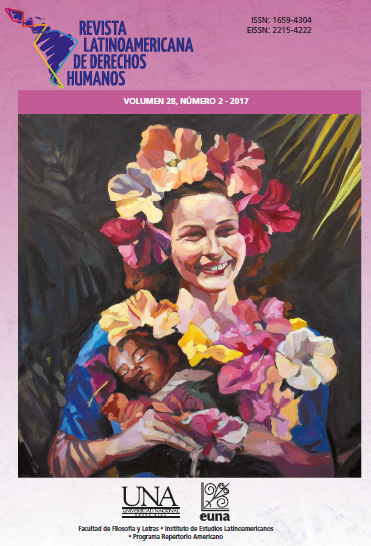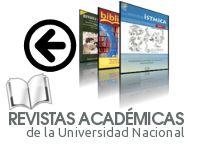Thinking About Education in Human Rights from an Ethical and Controversial Perspective
DOI:
https://doi.org/10.15359/rldh.28-2.1Keywords:
human rights education, ethics, controversialityAbstract
This paper delves into the relationship between the education in human rights and ethics from a controversial perspective. It is a direction that seeks to help people become active and participatory citizens in a pluralistic democracy. Three fundamental ethical principles are analyzed, and they allow teaching human rights through controversy: Human rights: a global ethics of human rights; human rights: an ethical minimum; human rights and moral pluralism. This article proposes to relate human rights education with the critical-dialogical pedagogy. In this perspective are identified four critical inquiry tools that serve to develop different dimensions for a critical understanding in the social sphere: the approach of the problem, the reflexive skepticism, the multiperspectivity, and systemic thinking.References
Beaumont, E. (2010). Political agency and empowerment; pathways for developing a sense of political efficacy in young adults. In L.R. Sherrod, J. Torney-Purta & C. Flanagan (Eds.), Handbook of research on civic engagement and youth. New York: Wiley, pp. 225-258.
Bermúdez, A. (2015). Cuatro herramientas para la indagación crítica de la historia, las ciencias sociales y la educación ciudadana. Revista de Estudios Sociales, 52, pp. 102-118. http://dx.doi.org/10.7440/res52.2015.07
Boco, R. y Bulanikia, G. (2010). Universalismo vs. relativismo cultural: una batalla por la definición de los derechos humanos y la discriminación. Mediações - Revista de Ciências Sociais, 15(1).
http://dx.doi.org/10.5433/2176-6665.2010v15n1p74
Brabeck, M. y Rogers, L. (2000). Human Rights as a Moral Issue: Lessons for moral educators from human rights work. Journal of Moral Education, 29(2), pp. 167-182. https://doi.org/10.1080/713679341
Carretero, M., Haste, H. y Bermúdez, A. (2016). Civic Education. In L. Corno & E.M. Anderman (Eds.) Handbook of Educational Psychology, 3rd Edition, Chapter 22. London: Routledge Publishers, pp. 295-308.
Cortina, A. (2003a). Pluralismo moral, ética de mínimos y ética de máximos. Cyber Humanitatis Nº 27, Invierno 2003. – Conferencia Universidad de Chile, pp. 1-13.
Cortina, A. (2003b). Ética Ciudadana y Modernidad. Cyber Humanitatis Nº 27, Invierno 2003.‒Conferencia Universidad de Chile, 7 de junio 2003, pp.1-13.
Davies, L. (2008). Educating against extremism. Sterling, VA: Trentham Books.
Dudai, R. (2014). Introduction—Rights Choices: Dilemmas of Human Rights Practice. Journal of Human Rights Practice, 6(3), pp. 389-398. https://doi.org/10.1093/jhuman/huu021
Duncan, G. (2000). Race and Human Rights Violations in the United States: Considerations for human rights and moral educators. Journal of Moral Education, 29(2), pp. 183-201. https://doi.org/10.1080/713679342
Ennis, R. (1996). Critical Thinking. Upper Saddle River: Prentice Hall
Facione, P. (1990). Critical Thinking: A Statement of Expert Consensus for Purposes of Educational Assessment and Instruction. Research Findings and Recommendations. Millbrae: The California Academic Press.
Freire, P. (1975). Pedagogía del oprimido, 16ª ed. Madrid: Siglo XXI.
Gadotti, M., Freire, P. y Guimarães, S. (1995). Pedagogía: diálogo y conflicto. 4ª. ed. Sao Paulo: Cortez Editora.
Giroux, H. (2003). Pedagogy of the Depressed: Beyond the New Politics of Cynicism. In M. Peters et al. (eds.), Critical Theory and the Human Condition: Founders and Praxis. New York: Peter Lang, pp. 143-168.
Hess, D. (2009). Controversy in the Classroom. The Democratic Power of Discussion. New York/London: Routledge.
Jaramillo, R. y Bermúdez, A. (2000). El análisis de dilemas morales, una estrategia pedagógica para el desarrollo de la autonomía moral. Bogotá: Grafivisión Editores. Disponible en: http://www.colombiaaprende.edu.co/html/docentes/
Kahne, J. y Sporte, S. (2008). Developing citizens: The impact of civic learning opportunities on students’ commitment to civic participation. American Educational Research Journal, 45(3), pp. 738-766. https://doi.org/10.3102/0002831208316951
Lipman, M. (2003). Thinking in Education, 2nd ed. Cambridge: Cambridge University Press. https://doi.org/10.1017/CBO9780511840272
Magendzo, A. (1994). Educación en Derechos Humanos. Apuntes para una nueva práctica. Santiago de Chile: PIIE.
Magendzo, A. (1998). La educación en derechos humanos: reflexiones y retos para enfrentar un nuevo siglo. En Boletín N° 47, Proyecto Principal de Educación en América Latina y el Caribe. UNESCO-OREALC, Santiago, Chile, pp. 27-33.
Magendzo, A. (2006). Educación en derechos humanos. Un desafío para los docentes de hoy. Santiago, Chile: LOM Ediciones.
Magendzo, A. y Toledo, M. (2009). Educación en Derechos Humanos: Currículum, Historia y Ciencias Sociales del 2º año de Enseñanza Media. Sub-unidad “Régimen militar y transición a la democracia”. Revista Estudios Pedagógicos, 35(1). Valdivia, Chile: Universidad Austral. http://dx.doi.org/10.4067/S0718-07052009000100008
Magendzo, A. y Pavez, J. (2015). Educación en Derechos Humanos: Una propuesta de educar desde la perspectiva controversial. Comisión de Derechos Humanos del Distrito Federal, Ciudad de México. Recuperado de: http://cdhdf.org.mx/wp-content/uploads/2015/10/Educaci%C3%B3n-en-derechos-humanos_Magendzo_Pav%C3%A9z.pdf
McPeck, J. (1981). Critical Thinking and Education. New York: St. Martin´s.
Misgeld, D. (1994). Human Rights and Education: conclusions from some Latin American experiences. Journal of Moral Education, 23(3), pp. 239-250. https://doi.org/10.1080/0305724940230302
Mutz, D. (2006). Hearing the other side: Deliberative versus participatory democracy. New York: Cambridge University Press. https://doi.org/10.1017/CBO9780511617201
Nussbaum, M. (2006). Education and Democratic Citizenship: Capabilities and Quality Education. Journal of Human Development 7(3), pp. 385-395. https://doi.org/10.1080/14649880600815974
Oser, F., Althof, W. y Higgins-D’Alessandro, A. (2008). The Just Community approach to moral education: system change or individual change?Journal of Moral Education, 37(3), pp. 395-415. https://doi.org/10.1080/03057240802227551
Pérez de Cuéllar, J. (1997). Nuestra diversidad creativa: Informe de la Comisión Mundial de Cultura y Desarrollo. Madrid: Ediciones UNESCO y Fundación Santa María.
Rein, T. (2013). Participación política de las mujeres. Aspectos de confluencia entre la ética y los derechos humanos. Acta Bioethica, 19(2). Santiago, Chile.
Siegel, H. (1988). Educating Reason: Rationality, Critical Thinking, and Education. New York: Routledge-Metheun.
Stitzlein, S. (2012). Teaching for dissent: Citizenship education and political activism. Boulder: Paradigm Publishers.
Torney-Purta, J. (2002). The school's role in developing civic engagement: a study of adolescents in twenty-eight countries. Applied Developmental Science, 6(4), pp. 203-212. https://doi.org/10.1207/S1532480XADS0604_7
Downloads
Published
How to Cite
Issue
Section
License
El material que se publica en esta Revista está bajo una licencia “Creative Commons” 3.0 Costa Rica (CC, Reconocimiento-NoComercial-SinObraDerivada 3.0 Costa Rica (CC BY-NC-ND 3.0 CR) . Esto significa que el material publicado en la revista se puede compartir (copiar y distribuir) en cualquier medio o formato considerando que se debe reconocer de forma adecuada la autoría del material y la fuente, no puede utilizarse con fines comerciales y no se aceptan las obras derivadas (remezclar, transformar o crear a partir del material).








